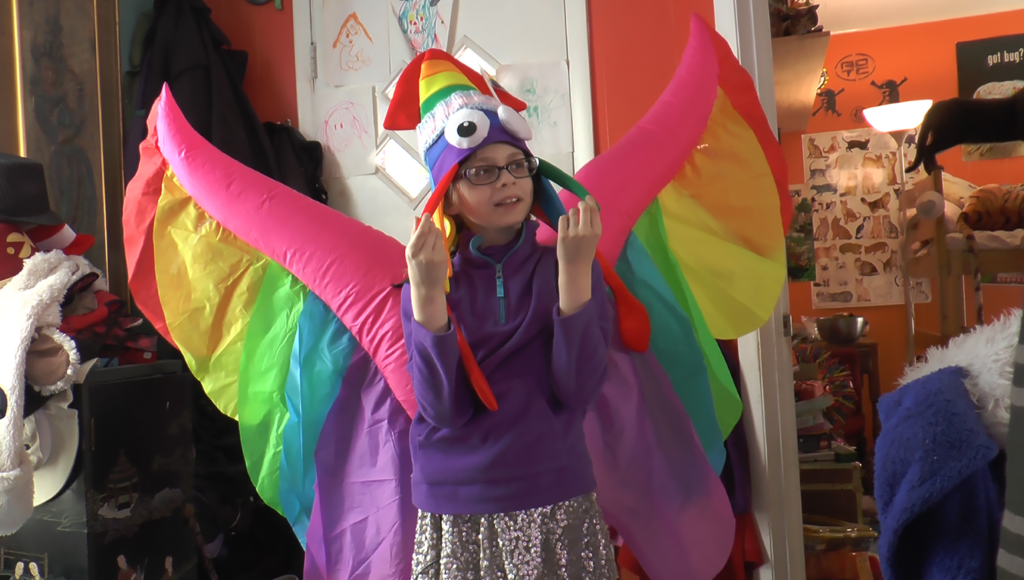Joy E. Reed brings over a decade of experience in documentary filmmaking as an associate editor and animator. She has been on the creative team of a number of films that have premiered at Sundance, including “Buck,” “How to Dance in Ohio,” and most recently, “This is Home,” winner of the 2018 Audience Award. Reed’s work has been broadcast on PBS, HBO, and festivals around the world. “Little Miss Westie” is her feature directorial debut.
“Little Miss Westie” will premiere at the 2018 DOC NYC film festival on November 10. The film is co-directed by Dan Hunt.
W&H: Describe the film for us in your own words.
JR: “Little Miss Westie” follows two transgender siblings during their year of transition. When Luca was 11 and living as a girl, he competed in the Lil’ Miss Westie beauty pageant, a local rite of passage. He is now coaching his little sister Ren through her pageant experience in her first year living as a girl, all set against the backdrop of the 2016 election.
W&H: What drew you to this story?
JR: My co-director, Dan Hunt, initially found the story and called to see if I’d be interested. As soon as I met this family, I was hooked. This is a family that is incapable of being anything but unapologetically who they are, and they’re a joy to spend time with.
W&H: What do you want people to think about when they are leaving the theater?
JR: A gay colleague of mine who watched an early cut said that this film challenged his assumptions about gender and made him rethink a few things. If folks walk out of the theater understanding that being transgender is just a tiny facet of what these whole, complicated, wonderful kids are, and that they deserve all the basic human rights and protections afforded to cisgender kids, I’ll feel pretty good.
If they’re moved to action to ensure it happens, I’ll feel even better.
W&H: What was the biggest challenge in making the film?
JR: I think for a documentary the biggest challenge is always funding. There are only so many foundations to go around, and it gets more and more competitive each year, what with the dwindling government support for the arts.
W&H: How did you get your film funded? Share some insights into how you got the film made.
JR: Dan and I both called every contact in our books, and we found some foundations that could see the value in the story early on. In addition, we had a Kickstarter campaign, and a few key professionals generously donated their time and skills, or worked at obscenely reduced rates because they believed in the project.
W&H: What inspired you to become a filmmaker?
JR: I have always been fueled by stories. I grew up in a rural farming community in Western New York in the days before the Internet. As a genderqueer kid — before I knew there was a name for that — I felt pretty isolated. When cable — and HBO! — finally came out to our road, movies became my window into a larger world, and through them I was able to imagine a different future for myself than than the one that appeared to be laid out for me.
W&H: What’s the best and worst advice you’ve received?
JR: Best advice: “If you’re the smartest person in the room, you’re in the wrong room.” You can’t do it all yourself, and it’s always best to surround yourself with trustworthy people who are knowledgeable and have the same goals as you do.
The worst advice? I don’t know. I try not to hang on to bad information. It was probably something along the lines of “sit like a lady.”
W&H: What advice do you have for other female directors?
JR: Whenever possible, be generous with your time — but don’t give it away to those who don’t appreciate it. Look to help others behind you. Or ahead of you. Or beside you. Find people you love to work with, and who love working with you.
W&H: Name your favorite woman-directed film and why.
JR: Favorites are always hard to pick, but one film I’ve really enjoyed is Miranda July’s “Me and You and Everyone We Know.” The cast is stellar, I’m a sucker for a good coming of age story, and I feel like it strikes just the right balance between the innocence and misery of being a kid.
W&H: Hollywood and the global film industry are in the midst of undergoing a major transformation. What differences have you noticed since the #MeToo and #TimesUp movements launched?
JR: I’m glad we’re moving in a positive direction, and I think we still have a long way to go.







